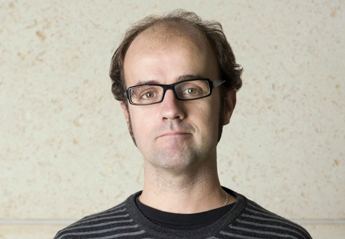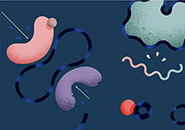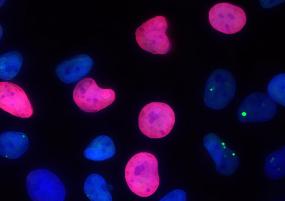
Scientific Discipline
Cancer Biology, Cell Biology
Related Links
Host Institution
Spanish National Cancer Research Center
Current Position
Óscar Fernández-Capetillo is a senior group leader, Genomic Instability Group, in the Molecular Oncology Program at the Spanish National Cancer Research Center, Madrid, Spain.
Current Research
Exploring the Role of Replicative Stress in Cancer and Aging
Research
Biography
When Óscar Fernández-Capetillo launched his laboratory seven years ago, he wanted a big challenge. So he began studying a poorly understood form of DNA damage that occurs when a cell replicates. This damage, called replicative stress, appears to play an important role in both cancer and aging. “This is a mystery,” he says. “No one knows exactly what replicative stress is.”
That’s just the right challenge for Fernández-Capetillo, a biochemist at the Spanish National Cancer Research Center, who describes himself as “naturally curious.” As a child growing up on Spain’s northern coast, he used to dissect shrimp and then try to reassemble them to get a handle on how they worked. Eventually, it became clear that science, which Fernández-Capetillo sees as a kind of “structured curiosity,” was a good fit.
After earning his Ph.D. in immunology from the University of The Basque Country in 2001, Fernández-Capetillo began a postdoc in André Nussenzweig’s lab at the National Cancer Institute. It was there he became interested in DNA damage. Nussenzweig was studying DNA repair in B-cell lymphocytes, a type of immune cell. In a process that creates the antibody diversity needed to fight off pathogens, these cells routinely break up and recombine their DNA. To fix these breaks, the cells undergo “very intricate DNA repair procedures,” he says. For three years, Fernández-Capetillo worked to understand them.
In 2004, he moved to the Spanish National Cancer Research Institute in Madrid. He was still interested in DNA damage but wanted to find his own niche. Around that time, he stumbled across two reports suggesting that high levels of replicative stress might play a role in cancer. Fernández-Capetillo was intrigued.
Every organism has evolved ways of repairing DNA damage. In the case of replicative stress, the repair mechanism involves two key proteins: ATR and Chk1. If cancer cells show higher levels of replicative stress, they might be especially dependent on these proteins, Fernández-Capetillo posited. If he could inhibit ATR and Chk1, he thought, cancer cells might accumulate so much replicative stress they would self-destruct.
To test the hypothesis, Fernández-Capetillo and his colleagues needed to find inhibitors. Using genetically engineered cultured cells, they developed a screening system to look for compounds that could block ATR. The process identified several promising compounds, which they tested on cancer cells. “These drugs are very efficient in killing cells that have lots of replicative stress,” he says. The team’s studies in mice suggest that ATR or Chk1 inhibitors could be particularly lethal for cancer cells that don’t respond to standard radiation therapy because they have lost the radiation-responsive gene p53—a potential boon for patients with radiation-resistant tumors.
Fernández-Capetillo also wanted a better understanding of the replicative stress repair mechanism. “Normally if you want to know the function of gene A, you make a mouse in which you have eliminated gene A and then you try to observe the resulting problem,” he says. But ATR and Chk1 appear to be essential: eliminate the genes and the mice die. Nonetheless, Fernández-Capetillo thought he might be able to a create mouse with “just a little bit of this response,” he says.
A breakthrough came in 2007, when a group of researchers reported that a rare human disease called Seckle syndrome could be induced by a single mutation in ATR. Fernández-Capetillo and his colleagues engineered a mouse with the same mutation, creating a model of the disease. The Seckle mice exhibit some of the same characteristics as humans with the disease—small bodies and bird-like faces, for example. They also produce almost no ATR, so they have little protection against DNA damage that occurs as cells divide. Studies on those mice led to some important insights. One of the most exciting observations was that Seckle mice age much faster than normal mice. The team showed that this rapid aging was the result of DNA damage the mice sustained in utero, while their cells were rapidly dividing. This led Fernández-Capetillo to propose the concept of “intrauterine programming of aging”—namely, that aging can be influenced by stresses organisms are exposed to in the womb.
Fernández-Capetillo isn’t sure where his curiosity will take him next. ATR inhibitors appear to hold real promise for treating cancer, so he feels obliged to test them further. But a familiar itch to study something new is surfacing. “I’m an explorer,” he says. And to be at the forefront of science, “you have to feel lost.”
Articles & News
Research Papers
Selected Research Papers




